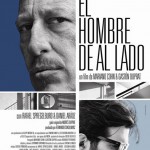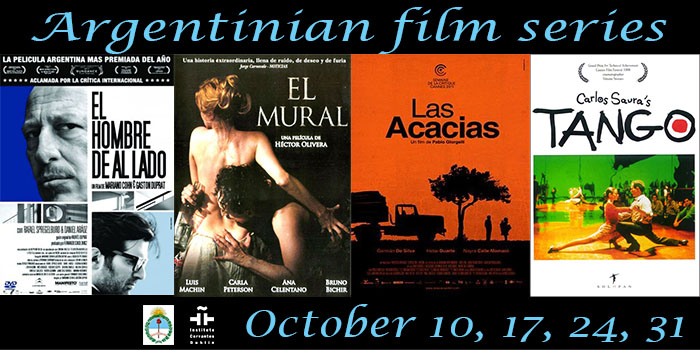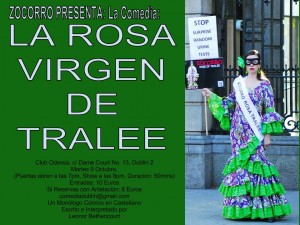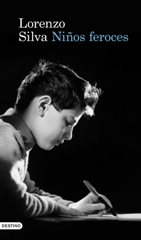Blog del Instituto Cervantes de Dublín
Torre Martello
Cine / Film screening: El mural
La segunda sesión del ciclo de cine argentino llega hoy a las seis al Café Literario con la proyección de la película El mural.
La trama desarrolla su acción en los años treinta, cuando llega al país David Alfaro Siqueiros. El film relata las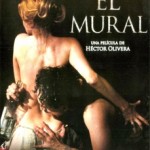 distintas circunstancias que llevaron al pintor a realizar el famoso mural en la quinta Los Granados, propiedad de Natalio Botana, con la colaboración de los pintores argentinos Lino Enea Spilimbergo, Antonio Berni y Juan Carlos Castagnino y el uruguayo Enrique Lázaro; más las complicadas y entrecruzadas relaciones entabladas entre los personajes protagonistas de la historia.
distintas circunstancias que llevaron al pintor a realizar el famoso mural en la quinta Los Granados, propiedad de Natalio Botana, con la colaboración de los pintores argentinos Lino Enea Spilimbergo, Antonio Berni y Juan Carlos Castagnino y el uruguayo Enrique Lázaro; más las complicadas y entrecruzadas relaciones entabladas entre los personajes protagonistas de la historia.
Película ganadora de cinco Premios Sur 2010: Mejor Fotografía, Mejor Montaje, Mejor Dirección artística, Mejor Diseño de vestuario y Mejor Maquillaje y Caracterización.
The second session of the Argentinian film series will be held today at 6pm at Cafe Literario with the screening of El mural.
The plot takes place in the 30s, when David Alfaro Siqueiros arrived to the country. The film relates the several circumstances leading the artist to paint the famous mural in Los Granados, the country estate of Natalio Botana, with the collaboration of Argentinean painters Lino Enea Spilimbergo, Antonio Berni and Juan Carlos Castagnino, and the Uruguayan Enrique Lázaro. The story reveals the complicated criss-cross relations among the main characters.
Awarded five Premios Sur 2010: Best Photography, Best Editing, Best Art Direction, Best Costume Design, Best Makeup and Portrayal.
Festival Literario ISLA / ISLA Literary Festival
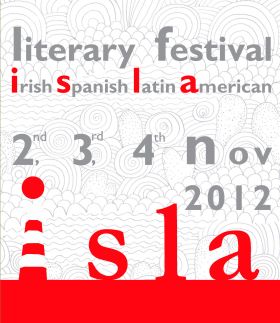 Irlanda es una isla grande y fértil. Una isla sembrada de escritores y de buena literatura. Un escritor, en algún momento de su labor creativa, también ha de convertirse en una isla, retirarse en silencio hasta el lugar en donde se encuentran las palabras, esas mismas palabras que luego descubrirá algún lector solitario, como un tesoro en una isla pirata, un tesoro en forma de libro.
Irlanda es una isla grande y fértil. Una isla sembrada de escritores y de buena literatura. Un escritor, en algún momento de su labor creativa, también ha de convertirse en una isla, retirarse en silencio hasta el lugar en donde se encuentran las palabras, esas mismas palabras que luego descubrirá algún lector solitario, como un tesoro en una isla pirata, un tesoro en forma de libro.
Un buen libro es una isla que contiene el universo.
ISLA es también el nombre que hemos querido dar a nuestro festival de literatura. Es el acrónimo de “Irish, Spanish and Latin American” Literary Festival. Es por tanto, también, una ISLA grande, fértil y multicultural en la que estamos todos unidos, irlandeses, latinoamericanos y españoles, por primera vez, en torno a la literatura.
Nunca antes se había celebrado un festival de estas características. Sin embargo, creemos que hacía ya mucho tiempo que venía siendo necesario. Hoy, gracias al entusiasmo demostrado tanto por Dublin UNESCO City of Literature, Ireland Literature Exchange, Poetry Ireland y el apoyo de las universidades Dublin City University, NUI Galway, NUI Maynooth y Trinity College Dublin, como por las embajadas de Argentina, Chile, Cuba, México y por supuesto por la Embajada de España, de la que el Instituto Cervantes forma parte, este festival es una realidad. Solo podemos tener palabras de agradecimiento para todos ellos.
Y aquí estamos todos, unidos en este proyecto. Comprometidos, comunicados, reunidos en este hermoso territorio común en el que hemos depositado tantas ilusiones.
No tiene sentido que algunas de las literaturas más fecundas del planeta sigan viviendo de espaldas entre sí. Es necesario que del intercambio de experiencias e ideas, de un mejor conocimiento entre unos y otros surjan nuevas traducciones, nuevos libros y, sobre todo, nuevos lectores.
Bienvenidos a nuestra ISLA.
Ireland is a great and fertile Island. It is an Island cultivated with writers and high quality literature. A writer during the course of his creative work must also become an island, withdrawing in silence to a place where words are kept. Those same words which some solitary reader will discover like hidden treasure on a pirate island, treasure in the form of a book.
A good book is a universe within an island.
The Spanish for ‘island’ is ‘ISLA’. It is the name we have chosen for our Literary Festival. It is the acronym for ‘Irish, Spanish and Latin American’ Literary Festival. It is also in that way a great, fertile and multicultural island where the Irish, Latin Americans and Spanish for the first time are all united and gathered around literature.
Never before has such a festival taken place. However, we believe it to be a much needed, unique event that has been a long time coming. Today, and thanks to the enthusiasm of Dublin UNESCO City of Literature, Ireland Literature Exchange, Poetry Ireland and the support of Dublin City University, Trinity College Dublin, NUI Galway, NUI Maynooth, the Embassies of Argentina, Mexico, Chile and Cuba, and by the Spanish Embassy, of which Instituto Cervantes is a part, this Festival is now a reality. We can only offer words of sincere gratitude to all of them.
We are all here, united in this project. Committed, connected and gathered together in this beautiful shared place where we have invested so many dreams.
It does not make sense that some of the most fertile literary figures on the planet should live in disregard for one another. It is imperative that from the exchange of experiences and ideas and from a better understanding between one another, new translations, new literature and, above all, new readers should emerge.
We wish you a warm welcome to our ‘island’ ISLA.
Matemagia: Matemáticas y Magia / Maths and magic en el Instituto Cervantes de Dublín
Fernando Blasco, mathematician, PhD in mathematics, and professor at the Universidad Politécnica de Madrid, visited the Instituto Cervantes in Dublin on the occasion of the “Maths Week Ireland 2012” and he made us enjoy the magic of mathematics with his “Matemagia”.
In this video, interviewed by Megan Specia in English, he shows us some of his “tricks”.
Fernando Blasco, matemático, profesor de la Universidad Politécnica de Madrid, visitó el Instituto Cervantes de Dublín con motivo de la Semana de la “Maths Week Ireland 2012” y nos hizo disfrutar de la magia de las matemáticas con su Matemagia.
En este video, entrevistado por Megan Specia en inglés, nos muestra algunos de sus “trucos”.
Audiolibro de la semana | Audiobook of the week: Libro del mal amor
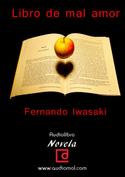 Esta semana te traemos en forma de audiolibro la primera novela del escritor y periodista peruano Fernando Iwasaki: Libro del mal amor. Para descargarte este audiolibro solamente tienes que tener el carnet en vigor de la biblioteca y hacer click aquí. Así conocerás a su personaje principal de una forma original y divertida: a través de las mujeres que no lo han amado.
Esta semana te traemos en forma de audiolibro la primera novela del escritor y periodista peruano Fernando Iwasaki: Libro del mal amor. Para descargarte este audiolibro solamente tienes que tener el carnet en vigor de la biblioteca y hacer click aquí. Así conocerás a su personaje principal de una forma original y divertida: a través de las mujeres que no lo han amado.
La poco afortunada vida amorosa del protagonista se nos presenta en diez capítulos que llevan el nombre de otras tantas mujeres que le han dado calabazas a lo largo de los años. Experiencias que no sólo tienen un lado negativo pues son asumidas con gran sentido del humor.
A través de esta hilarante crónica de fracasos amorosos, el protagonista, en su afán por perseguir a la mujer de sus sueños se convierte en deportista, patinador, político universitario, vegetariano, judío y experto en ballet. Estas circunstancias lo llevan a vivir insospechadas y sorprendentes situaciones desarrolladas en la década de los 70 y principios de los 80.
This week we bring you a new audiobook, the fist novel of Peruvian writer and journalist Fernando Iwasaki: Libro del mal amor. To download this audiobook you only need to have a valid library card and make click here. You will get to know the main character of the story in an original and funny way: through the women who did not love him.
The unlucky love life of this man is shown in ten chapters named after ten women who rejected him through the years. These experiences don´t have just a negative side as they are received with a great sense of humour.
The protagonist lives a hilarious chronicle of love failures and in his attempt to chase the woman of his dreams he becomes a sports man, skater, politician, university student, vegetarian, Jewish and ballet dancer. These circumstances lead him to live unexpected and surprising experiences during the 70s and early 80s.
Concierto de guitarra clásica / Classic guitar concert: Inspiración española de Alan Grundy / Spanish Inspirations by Alan Grundy
Con motivo del Día de la Hispanidad, el Instituto Cervantes de Dublín se complace en presentar de nuevo sobre su escenario del Café Literario al afamado guitarrista clásico irlandés Alan Grundy. Te esperamos hoy día 11 de octubre a las 20:00 h en el Café Literario.
escenario del Café Literario al afamado guitarrista clásico irlandés Alan Grundy. Te esperamos hoy día 11 de octubre a las 20:00 h en el Café Literario.
Inspiración Española – un recital de guitarra a cargo del guitarrista Alan Grundy, compuesto por piezas inspiradas en el baile, la canción, la poesía, la pintura, los nombres y lugares de España. Desde danzas cortesanas de los siglos XVI y XVII de los compositores Diego Pisador, Alonso Mudarra y Gaspar Sanz (tocadas por Alan con vihuela y guitarra barroca) a piezas del siglo XIX de Albéniz y Tárrega inspiradas en nombres y lugares de España. El repertorio incluye también dos piezas originales compuestas por Alan Grundy, Día de España y The Old Guitarrist / La Guitarra.
Entradas: 15 /10 € SRC: reservas.dublin@cervantes.es
On the occasion of the near-coming Spanish National Day, Instituto Cervantes Dublin is delighted to bring again on stage renowned Irish classical guitarist Alan Grundy. The concert is today at 8.00pm at our Café Literario.
‘Spanish Inspiration’ – A Guitar Recital by guitarist Alan Grundy featuring guitar works inspired by Spanish Dance, Song, Poetry, Painting, Names and Places. From Court Dances of the 16th and 17th Centuries by Diego Pisador, Alonso Mudarra and Gaspar Sanz (played by Alan on Vihuela and Baroque Guitar), to 19th Century pieces inspired by Spanish names and places by Albeniz and Tarréga. The Recital will also feature two original works by Alan Grundy – Dia de España and The Old Guitarist / La Guitarra.
Tickets: 15 /10 € RSVP: reservas.dublin@cervantes.es
Cine / Film screening: El hombre de al lado / The man next door
Comenzamos un nuevo ciclo de cine con algunas de las mejores películas de la cinematografía argentina de los últimos años. Te esperamos hoy a las seis en el Café Literario.
El hombre de al lado narra un conflicto entre vecinos que parece no tener fin. Una simple pared medianera puede dividir dos mundos, dos maneras de vestir, de comer, de vivir. De un lado Leonardo (Rafael Spregelburd), fino y prestigioso diseñador que vive en una casa realizada por Le Corbusier. Del otro lado Víctor (Daniel Aráoz), vendedor de autos usados, vulgar, rústico y avasallador. Víctor decide hacer una ventana para tener más luz, y ahí empieza el problema: cada uno toma conciencia de la existencia del otro.
Película seleccionada para los Premios Goya como Mejor película extranjera de habla hispana.
We start a new cinema series today with the screening of some of the best and most recent Argentinian films. The first film will be shown today at 6pm at Café Literario.
A small incident over two neighbours common wall sparks a conflict which affects the intimacy of the view over the chimney; the protagonist sparks a conflict and with paranoiac obsession destroys everyday life.
In the Argentine black comedy The Man Next Door privacy becomes an issue for the main character, Leonardo, whose home happens to be the Curutchet house inLa Plata, Argentina, which was designed by Le Corbusier in 1949.
Living in a design icon certainly has its drawbacks. It’s bad enough that Leonardo has to deal with pushy tourists who constantly ask for tours, but then his neighbor Victor attempts — without Leonardo’s permission — to build a window in a dividing wall between the two houses, to get more sunlight. The window, to Leonardo’s horror, would allow the rather boorish Victor to see all the intimate details of Leonardo’s family’s life.
Goya Awards nomination for best Spanish Language Foreign Film.
Nuevo ciclo de cine argentino en el Cervantes de Dublín / Argentinian Film series at #ICervantes #Dublin
Mañana miércoles comienza el nuevo ciclo de cine argentino en el Instituto Cervantes de Dublín, ofrecido por la Embajada de Argentina en Irlanda.
El cine argentino ha sido históricamente una de las tres filmografías más desarrolladas dentro del cine latinoamericano, junto a las producciones mexicanas y brasileñas.
Así, el cine creado en Argentina durante el siglo XX se convirtió en uno de los principales embajadores del idioma español por el mundo. La bandera de Argentina, del año 1897, se podría considerar como la primera obra cinematográfica nacional y desde su estreno hasta nuestros días han llegado a las pantallas cerca de 2500 películas argentinas con gran éxito de crítica y público, siendo La historia oficial (1985) y El secreto de sus ojos (2009) ganadoras del Oscar a la Mejor Película Extranjera.
En este ciclo podrás ver películas muy recientes como El hombre de al lado (2010), El mural (2010) o Las acacias (2011).
El ciclo será inaugurado mañana, 10 de octubre a las 18h con una recepción por cortesía de la Embajada de Argentina en Irlanda.
Come and enjoy the four films screened in this series offered by the Embassy of Argentina and Instituto Cervantes Dublin.
You will be able to see how Argentine cinema has been historically one of the three most developed productions of Latin American cinema, followed by Mexican and Brazilian production.
This way, the variety of films produced in Argentina during the 20th century bacame one of the most important ambassadors of the Spanish language all over the world. La bandera de Argentina (1897) could be considered the first national cinematographic piece and since its premiere, nearly 2500 argentine films have reached theatre screens with great acclaim from both critics and audiences.
Worth mentioning are La historia oficial (1985) and El secreto de sus ojos (2009), both awarded an Oscar for Best Foreign Language Film.
You could enjoy of recent films such as The man of next door (El hombre de al lado, 2010), El mural (The mural, 2010) or Las acacias (2011).
The Embassy of Argentina offers a wine reception on the opening of the film series, in October 10th at 6 pm.
[Video] Entrevista a Sheila Ríos en el Instituto Cervantes de Dublín
Sheila Ríos, de madre irlandesa y padre mexicano, ofreció un concierto en nuestro instituto el pasado 2 de octubre. Unos minutos antes, nos concedió una entrevista en la que habló de su carrera musical, su relación con Maná, y otros temas.
Sheila Ríos cuenta con una trayectoria artística llena de experiencia y reconocimiento. Su historia siempre ha estado envuelta en música, marcada por la herencia artística y nostálgica de Irlanda junto al romanticismo de las canciones mexicanas.
La música la ha llevado a muchas partes del mundo, con diferentes agrupaciones y como solista, destacando su participación con la banda mexicana de rock más reconocida y famosa a nivel internacional, “Maná”, con quienes ha compartido más que una profesión… una vida.
Ahora se encuentra trabajando en un nuevo disco donde interpreta sus propias composiciones. El más reciente, “Trozos de Luna”, fue producido por Fher, el líder y catante de “Maná”, junto con Fernando Quintana, quien en esta ocasión la acompaña en esta visita a sus raíces, en la bella Irlanda.
Sheila Ríos (Guadalajara, Jalisco, Mexico). With an Irish mother and a Mexican father, Sheila Ríos has an artistic trajectory full of experience and recognition. Her story has always been connected with music, marked by the artistic and nostalgic heritage and the romanticism of Mexican songs.
Her music has taken her to many parts of the world, both as solo artist and with different groups, of which “Maná” especially stands out, the most recognized and famous Mexican rock band, with whom she has shared more than a profession…a life.
Now she is working with new material where she interprets her own compositions. The most recent one, “Trozos de Luna”, was produced by Fher, the leader and singer of “Maná”, along with Fernando Quintana, who in this occasion is accompanying her during the visit to her roots in beautiful Ireland.
La rosa virgen de Tralee
¿Conoces ya a la rosa más española de Tralee?
Zocorro es una chica inocente y muy natural, cualidades ideales para presentarse al prestigioso concurso irlandés La Rosa de Tralee. Pero sus sueños se ven arrastrados por la verde hierba Irlandesa en esta divertidísima comedia presentada en castellano en Dublin.
La Rosa Virgen de Tralee, el próximo Martes 9 de Octubre en el Club Odessa, c/Dame Court, No. 13, Dublin 2.
Entradas, si reservas con antelación por email: 8 euros comediadublin@gmail.com Si comprar en la puerta, el día de la representación: 10 euros.
Club Odessa, c/ Dame Court No. 13, Dublin 2
Martes 9 Octubre,
(Las puertas abren a las 7pm, Show a las 8pm, Duración: 50 mins)
Reservas por email: comediadublin@gmail.com
Un Monólogo Cómico en Castellano
Escrito e Interpretado por Leonor Bethencourt
Dear Friends and Friendees,
Zocorro is an innocent and natural girl, perfect qualities to be a candidate for the prestigious Irish competition “The Rose of Tralee”. But her dreams are dragged along the green Irish grass in this hilarious comedy in Spanish in Dublin: “La Rosa Virgen de Tralee”, next Tuesday October 9th at Odessa Club, Dame Court No. 13, Dublin 2.
Odessa Club, Dame Court No. 13, Dublin 2
Tuesday 9th October
(Doors open at 7pm)
Tickets: 10 Euro at the door or 8 Euro if you reserve by email at: comediadublin@gmail.com
A comic monologue in Spanish
Written and performed by Leonor Bethencourt
Autor del mes | Author of the month: Lorenzo Silva
Nuestro autor del mes de octubre es Lorenzo Silva (Madrid, 1966), uno de los escritores con el que tendremos el gusto de contar el mes que viene en el Festival ISLA, que celebramos en el Instituto Cervantes y al que por supuesto, quedáis todos invitados. Se trata de uno de los autores más representativos del panorama literario actual con una obra prolífica y de gran calidad, que ha traspasado nuestras fronteras habiendo siendo traducida a varios idiomas. Su estilo literario se caracteriza por ser ágil, directo y cercano, haciendo uso de un sentido del humor refinado y exquisito.
Curiosamente, su trayectoria laboral empezó siendo auditor de cuentas, asesor fiscal y abogado, simultaneando al mismo tiempo su labor literaria que comenzó en el año 1980.
A partir del año 2002 decidió dedicarse en exclusiva a su trabajo literario con la publicación de numerosos trabajos en narrativa, ensayos, libros de viajes e incursiones en la literatura infantil y juvenil. Es colaborador en varios medios de comunicación.
Es autor de novelas como La sustancia interior, La flaqueza del bolchevique o Niños feroces, del libro de relatos El déspota adolescente y del libro de viajes Del Rif al Yebala. Viaje al sueño y la pesadilla de Marruecos. En 2004 editó, junto a Marta Cerezales y Miguel Ángel Moreta, La puerta de los vientos, una antología de narradores marroquíes contemporáneos. En 2006 publicó junto a Luis Miguel Francisco Y al final, la guerra, un libro-reportaje sobre la intervención de las tropas españolas en Irak, y en 2008 el ensayo El Derecho en la obra de Kafka.
También es autor de la popular serie policíaca protagonizada por los investigadores Bevilacqua y Chamorro, que cuenta con seis entregas hasta la fecha. Millones de seguidores esperan con impaciencia cada nuevo título sobre la peripecia de esta singular pareja que camina al ritmo de los cambios sociales, políticos y culturales que van transformando la realidad española.
Su trabajo ha sido reconocido con premios tan prestigiosos como el Premio Nadal de Novela 2000 con El alquimista impaciente, el Premio Primavera de Novela 2004 con Carta Blanca. También fue finalista con La flaqueza del Bolchevique al Premio Nadal de Novela en el año 97.
Desde la biblioteca os invitamos a conocer a este autor poniendo a vuestra disposición una selección de su obra.
Our author of the month in October is Lorenzo Silva (Madrid, 1966). He will be here with us next month, participating in the Literary Festival ISLA organized at Instituto Cervantes. We are delighted to invite you all to this event.
He is one of the most representative writers of the Spanish literary scene today, with a prolific and high quality work that has crossed borders and been translated into several languages. His literary style is lively, direct and close, using a subtle and ironic sense of humour.
Surprisingly, he started his career as an auditor, tax consultant and solicitor while he also commenced his literary work in 1980.
He decided to focus in writing in 2002 and since then, he has published a wide variety of works in narrative, essays, travel books and incursions in children´s and young adult literature. He contributes to several means of communication.
He is the author of novels such as La sustancia interior, La flaqueza del bolchevique or Niños feroces, the short-stories book El déspota adolescente and the book of travels Del Rif al Yebala. Viaje al sueño y la pesadilla de Marruecos. He edited along with Marta Cerezales and Miguel Ángel Moreta, La puerta de los vientos, an anthology of comtemporary Moroccan narrators. He published in 2002 in cooperation with Luis Miguel Francisco, Y al final, la guerra, a documentary-book about the involvement of Spanish troops in Irak and in 2008, the essay El Derecho en la obra de Kafka.
He has also written a popular detective series starring the investigators Bevilacqua and Chamorro. The series has six novels up to this time. Millions of fans wait impatiently for each new book about this singular couple who walks at the same pace as social, political and cultural changes transform the Spanish reality.
His work has been recognized with prestigious awards like the Nadal Award in 2000 for El alquimista impaciente or the Primavera Award in 2004 for Carta Blanca.
He was short-listed as well with La flaqueza del Bolchevique for the Nadal Award in 1997.
We invite you to find out more about Lorenzo Silva´s books here at the library where we have a selection of his work.
Audiolibro de la semana / Audiobook of the week: El padre de Blancanieves
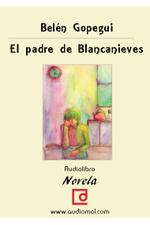 El audiolibro de la semana nos llega de la mano de Belén Gopegui con el enigmático título de El padre de Blancanieves. Para descargártelo, solo tienes que pulsar aquí con tu nombre de usuario y contraseña.
El audiolibro de la semana nos llega de la mano de Belén Gopegui con el enigmático título de El padre de Blancanieves. Para descargártelo, solo tienes que pulsar aquí con tu nombre de usuario y contraseña.
En El padre de Blancanieves, una profesora de instituto espera en su casa a que el repartidor del supermercado le traiga la compra. El repartidor se retrasa y ella se marcha. Horas después encuentra que le han dejado la compra a unos vecinos y se han estropeado los productos congelados.
La profesora llama al supermercado para quejarse. Al día siguiente, aún no se ha quitado el pijama cuando llaman al timbre; es el repartidor del supermercado, un hombre de Ecuador. El hombre le dice que por causa de su llamada telefónica le han despedido.
La profesora lamenta el incidente, pero el hombre insiste: ella es responsable de su despido, debe encontrarle otro empleo. A partir de ese momento, la vida de la profesora se ve afectada, y con ella, la vida de su familia.
Our audiobook of the week comes from the hand of Belén Gopegui with the enigmatic title of El padre de Blancanieves. To download it, just click here with your user name and password.
In El padre de Blancanieves, a school teacher is at home waiting for the delivery man that will bring her grocery shopping. He is late and she goes to work. When she returns, she realize that the delivery man left her products with her neighbors, and the frozen products are spoiled.
She calls the store to complain. The next day, she still has not taken off his piyama when the doorbell rings. It is the delivery man from the supermarket, a man from Ecuador. The man says that because of his phone call, he has been fired.
The teacher regrets the incident but the man insists, she is responsible for his firing. From that moment, the teacher’s life is affected, and with it, the life of her family.
La biblioteca propone: Cine argentino | The library suggests: Argentinian Cinema
El cine argentino más actual llega este mes a nuestra pantalla del Café Literario, dentro de nuestra programación cultural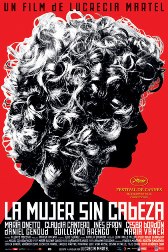 para el mes de octubre.
para el mes de octubre.
También desde la biblioteca también queremos rendir homenaje a una de las cinematografías más potentes de Sudamérica tanto por la calidad de sus películas como por el número de producciones.
Tras la dolorosa dictadura que sufrió Argentina durante la década de los 70 y primeros años de los 80, su cine experimentó un nuevo renacer. Realizadores como María Luisa Bemberg con Camila, Luis Puenzo con La Historia Oficial y Adolfo Aristarain (Tiempo de revancha, Un lugar en el mundo), atrajeron la mirada de nuevos públicos.
En la década del noventa surge una nueva corriente denominada normalmente como nuevo cine argentino, marcada por el carácter independiente de las realizaciones y un cambio en la mirada. El precursor en este movimiento es Martín Rejtman con su ópera prima Rapado en 1991.
A esta película le siguieron Mundo Grúa, El bonaerense y otras que continuaron esa línea de películas de tónica y personajes reales, bajo presupuesto y actores no conocidos.
The latest Argentinian cinema comes to our screen in the Café Literario, as part of the cultural programme in October.
From the library we would like to pay tribute as well to one of the most powerful cinematographies of South America referring to the number and quality of its films.
After the military dictatorship during the 70s and first part of the 80s, Argentinian cinema experienced a new reawakening . Films makers such as María Luisa Bemberg with Camila, Luis Puenzo with La historia oficial and Adolfo Aristarain (Tiempo de revancha, Un lugar en el mundo) attracted the interest of a new audience.
There was a new trend during the 90s usually called the new Argentinian cinema and it stood out because of the independent style of the films and a change in its approach.
The precursor of this change was Martin Rejtman with his opera prima Rapado in 1991.
After this film we can find Mundo Grúa, El bonaerense and other films that continued that style with realistic characters, low budget and not very well-known actors.
Concierto / Concert: Sheila Ríos
 La mejor música mexicana llega hoy al Café Literario a las 19:00h de la mano de la cantante Sheila Ríos con el espectáculo “Regresando a sus raíces”.
La mejor música mexicana llega hoy al Café Literario a las 19:00h de la mano de la cantante Sheila Ríos con el espectáculo “Regresando a sus raíces”.
Sheila Ríos (Guadalajara, Jalisco, México). De madre irlandesa y padre mexicano, Sheila Ríos cuenta con una trayectoria artística que lejos de ser larga, está llena de experiencia y reconocimiento. Su historia siempre ha estado envuelta en música, marcada por la herencia artística y nostálgica de Irlanda junto al romanticismo de las canciones mexicanas.
La música la ha llevado a muchas partes del mundo, con diferentes agrupaciones y como solista; destacando su participación con la banda mexicana de rock más reconocida y famosa a nivel internacional, “Maná”, con quienes ha compartido más que una profesión… una vida.
Ahora se encuentra trabajando en un nuevo material donde interpreta sus propias composiciones. El más reciente, “Trozos de Luna”, fue producido por Fher, el líder y catante de “Maná”, junto con Fernando Quintana, quien en esta ocasión la acompaña en esta visita a sus raíces, en la bella Irlanda.
Reservas: reservas.dublin@cervantes.es
Don´t miss today the best of Mexican music with the singer Sheila Ríos at 7pm at the Café Literario. She will be performing her show “Going back to the roots”.
Sheila Ríos (Guadalajara, Jalisco, Mexico). With an Irish mother and a Mexican father, Sheila Ríos has an artistic trajectory that is far from being long and still full of experience and recognition. Her story has always been connected with music, marked by the artistic and nostalgic heritage and the romanticism of Mexican songs.
Her music has taken her to many parts of the world, both as solo artist and with different groups, of which “Maná” especially stands out, the most recognized and famous Mexican rock band, with whom she has shared more than a profession…a life.
Now she is working with new material where she interprets her own compositions. The most recent one, “Trozos de Luna”, was produced by Fher, the leader and singer of “Maná”, along with Fernando Quintana, who in this occasion is accompanying her during the visit to her roots in beautiful Ireland.
Novedades en la biblioteca: octubre 2012 / New to the library: October 2012
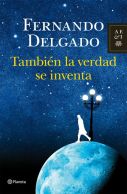 Las novedades de la biblioteca pueden ser consultadas en nuestro catálogo en línea, como es habitual.
Las novedades de la biblioteca pueden ser consultadas en nuestro catálogo en línea, como es habitual.
Para ello, seleccione ÚLTIMAS ADQUISICIONES y elija el período de tiempo que le interesa: ”el último mes” o “los últimos tres meses”.
Ésta es nuestra selección para los meses de octubre de 2012.
The lastest additions to the library catalogue can be consulted on line as usual.
Click ÚLTIMAS ADQUISICIONES and choose the time period: “el último mes” or “los tres últimos
meses”.
This is our selection for October 2012.
[Video] Cecilia Gandarias habla sobre la exposición «Geografía Postal»
En la primera mitad del siglo XX, las familias García Lorca y De los Ríos se enviaban postales casi todos los días, creando así una amplísima colección que ahora se expone en el Instituto Cervantes. Cecilia Gandarias, comisaria de la exposición, nos habla de cómo surgió la idea para esta exposición y de como se realizó la selección de las postales.
La exposición estará abierta del 20/09/2012 al 17/11/2012.
El horario de visita es: Lun.- jue.: 14-19 h. Sáb: 10-14 h. Cerrado vie., dom. y festivos
In the first half of the 20th Century two families, García Lorca and De los Ríos, sent each other postcards almost daily. A selection of this huge collection of postcards is now on display at the Instituto Cervantes in Dublin. Cecilia Gandarias, exhibition curator, explains us in this video how they came to the idea of organizing this exhibition and how Martin Parr, photographer and specialist in postcards, made the selection.
This display will bring us closer to the most intimate side of the poet´s life.
The exhibition is open fro the 20/09/2012 to 17/11/2012.
Opening hours: Mon-Thur: 2-7pm. Sat: 10am-2pm. Closed on Fridays, Saturdays and Bank Holidays.
